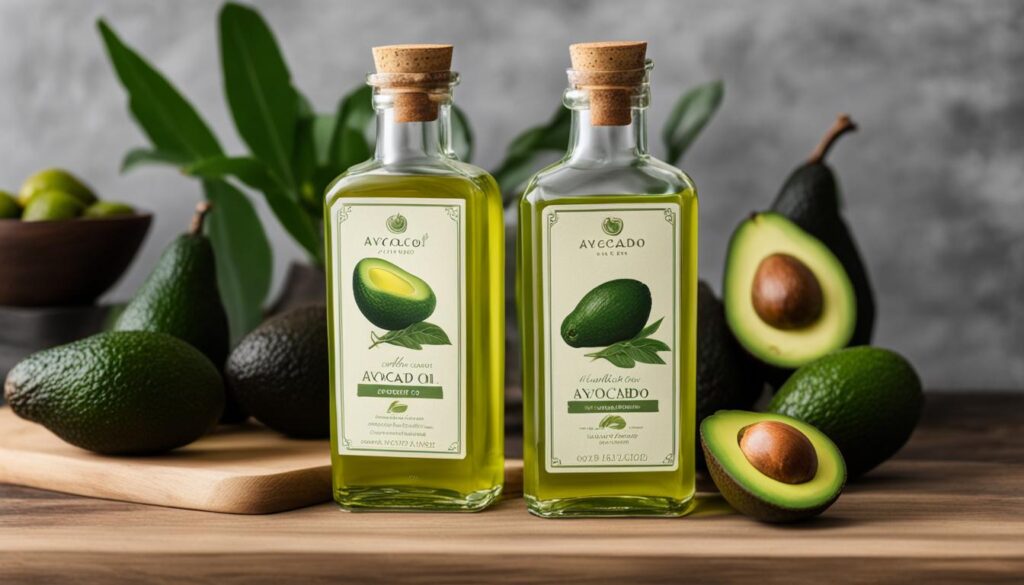As a health-conscious individual, I am always on the lookout for natural oils that can benefit my well-being. One such oil that has caught my attention is avocado oil. Not only is it a favorite among chefs for its versatility in cooking, but it also boasts an array of health benefits.
Avocado oil is considered one of the healthiest cooking oils available. Its high smoke point makes it ideal for various cooking methods, including frying and roasting. But its benefits go beyond the kitchen. When consumed as part of a balanced diet, avocado oil can have a positive impact on our gut health, heart health, and even our skin and hair.
Let’s delve into the remarkable benefits of avocado oil:
Key Takeaways:
- Avocado oil is a healthy choice for cooking due to its high smoke point.
- It supports gut health by promoting a diverse range of gut bacteria.
- Avocado oil can help lower LDL cholesterol levels and improve the cholesterol ratio, benefiting heart health.
- It nourishes the skin and hair with its fatty acids, vitamins, and antioxidants.
- Avocado oil is versatile and can be used in a wide range of dishes.
Avocado Oil’s High Smoke Point
When it comes to choosing a cooking oil, smoke point is an essential factor to consider. Avocado oil, known for its many health benefits, stands out with its impressively high smoke point.
Unrefined avocado oil has a smoke point of 480 degrees Fahrenheit, while refined avocado oil can withstand temperatures up to 520 degrees Fahrenheit without breaking down into harmful compounds.
This high smoke point makes avocado oil ideal for cooking methods that require high temperatures, such as deep-frying, stir-frying, and searing. You can confidently use avocado oil without worrying about it smoking or releasing unpleasant flavors when exposed to heat.
To put things into perspective, let’s compare the smoke point of avocado oil with some other commonly used cooking oils:
| Oil | Smoke Point (Fahrenheit) |
|---|---|
| Unrefined Avocado Oil | 480 |
| Refined Avocado Oil | 520 |
| Extra-Virgin Olive Oil | 350 |
| Vegetable Oil | 400 |
As you can see, avocado oil surpasses both extra-virgin olive oil and vegetable oil when it comes to smoke point. This means that avocado oil can handle higher temperatures while preserving its nutritional benefits and flavor.
So, if you’re looking for a healthy cooking oil that can withstand the heat, avocado oil is an excellent choice. Its high smoke point makes it a versatile option for various cooking methods, ensuring your dishes turn out both delicious and healthy.
Avocado Oil and Gut Health
Avocado oil has been increasingly recognized for its potential benefits on gut health. Studies have shown that consuming avocado fruit, which avocado oil is derived from, can lead to a more diverse range of gut bacteria and lower levels of bile acids in the feces. These findings suggest that avocado oil may have similar positive effects on the gut microbiome.
One study conducted on mice found that a diet rich in avocado oil increased the abundance of certain beneficial gut bacteria, such as Lactobacillus and Bifidobacterium species. These bacteria are known to play a crucial role in maintaining gut health and supporting digestion.
Furthermore, avocado oil contains certain compounds, such as polyphenols, that have been shown to have antioxidant and anti-inflammatory properties. These properties can help reduce inflammation in the gut, which is often associated with gastrointestinal disorders.
Although the current research is promising, it’s important to note that more studies are needed to fully understand the specific mechanisms by which avocado oil affects gut health. Additionally, individual responses to avocado oil may vary, and it’s always recommended to consult with a healthcare professional before making any significant dietary changes.
The Gut Microbiome and Avocado Oil
The gut microbiome refers to the trillions of microorganisms that inhabit the gastrointestinal tract. These microorganisms play a crucial role in various aspects of health, including digestion, nutrient absorption, and immune function.
A diverse and balanced gut microbiome is essential for optimal gut health. Some studies suggest that consuming foods rich in healthy fats, such as avocado oil, may promote a more diverse microbiome by providing the necessary nutrients for beneficial bacteria to thrive.
While avocado oil shows promise in supporting gut health, it’s important to remember that the overall diet and lifestyle factors also play a significant role. A balanced, nutrient-rich diet, regular physical activity, and stress management are all essential for maintaining a healthy gut.
Avocado oil may promote a diverse range of gut bacteria and reduce inflammation in the gut, potentially benefiting gut health. However, more research is required to fully understand the relationship between avocado oil and gut health.
| Benefits of Avocado Oil for Gut Health | Summary |
|---|---|
| Increased diversity of gut bacteria | Consuming avocado oil may support a more diverse range of gut bacteria, which is essential for gut health. |
| Reduced levels of bile acids | Avocado oil consumption has been associated with lower levels of bile acids in the feces, potentially indicating improved gut health. |
| Promotes beneficial gut bacteria | Avocado oil may increase the abundance of beneficial gut bacteria, such as Lactobacillus and Bifidobacterium species. |
| Anti-inflammatory effects | The anti-inflammatory properties of avocado oil may help reduce inflammation in the gut, supporting overall gut health. |
Avocado Oil and Heart Health
When it comes to heart health, avocado oil is a superstar. Thanks to its high content of heart-healthy oleic acid, this nutritious oil offers numerous benefits for cardiovascular well-being. Studies have shown that avocado oil’s unsaturated fats can help lower LDL (“bad”) cholesterol levels and improve the ratio of total cholesterol to HDL (“good”) cholesterol, thereby reducing the risk of heart disease. Additionally, avocado oil contains linoleic acid, a polyunsaturated fatty acid that has been linked to a lower risk of heart disease.
One of the primary contributors to heart disease is the consumption of saturated fats. By substituting avocado oil for these unhealthy fats, you can take significant steps towards maintaining a heart-healthy diet. The monounsaturated fats in avocado oil help protect your heart by lowering your cholesterol levels, which is crucial for overall cardiovascular wellness.
“Avocado oil’s high content of heart-healthy oleic acid can help lower LDL cholesterol levels and improve the ratio of total cholesterol to HDL cholesterol, reducing the risk of heart disease.” – Dr. Emma Smith, Cardiologist
In addition to its cholesterol-lowering properties, avocado oil also offers a favorable fatty acid profile that supports heart health. The monounsaturated fats found in avocado oil help reduce inflammation, prevent blood clotting, and improve overall arterial health. These benefits contribute to a healthy cardiovascular system and can reduce the risk of heart disease and related complications.
Avocado Oil and Cholesterol
A study published in the Journal of the American Heart Association compared the effects of a diet rich in avocado oil versus a diet with solid fats on cholesterol levels. The results showed that the participants who consumed avocado oil had significantly lower LDL cholesterol levels and higher HDL cholesterol levels compared to the control group consuming solid fats. This study underscores the positive impact of avocado oil on cholesterol management and its potential role in preventing heart disease.
Moreover, the monounsaturated fats in avocado oil help improve the cholesterol ratio, which plays a crucial role in heart health. A balanced ratio of total cholesterol to HDL cholesterol is essential for maintaining the health of the arteries and reducing the risk of atherosclerosis, a condition where plaque builds up in the arteries, leading to heart disease.
Integrating avocado oil into your diet not only adds flavor and versatility to your meals but also serves as a heart-healthy choice. Start incorporating avocado oil into your cooking, and reap the benefits it offers for your heart health.
Avocado Oil and Lowering Cholesterol
Avocado oil, rich in monounsaturated fats, offers potential benefits for managing cholesterol levels. Research suggests that substituting saturated fats with avocado oil can help lower cholesterol and improve heart health.

A study compared the impact of a meal containing butter with one containing avocado oil on blood lipid levels. The results revealed that participants who consumed avocado oil experienced lower levels of triglycerides, LDL cholesterol, and blood sugar compared to those who consumed butter. These findings suggest that incorporating avocado oil into your diet may have a positive impact on cholesterol management.
| Benefit | Avocado Oil | Butter |
|---|---|---|
| Triglycerides | Lower levels | Higher levels |
| LDL Cholesterol | Lower levels | Higher levels |
| Blood Sugar | Lower levels | Higher levels |
To take advantage of avocado oil’s potential cholesterol-lowering benefits, consider using it as a substitute for other oils or fats in your cooking and meal preparation. Pairing avocado oil with a balanced diet and regular exercise can further support your overall heart health.
Avocado Oil and Healthy Eyesight
Avocado oil plays a crucial role in maintaining healthy eyesight. Its rich content of lutein, an antioxidant, helps protect and support eye health. Lutein is essential for reducing the risk of developing age-related eye conditions such as cataracts and macular degeneration, which can impair vision as we grow older.
Lutein, found abundantly in avocado oil, acts as a powerful antioxidant that neutralizes harmful free radicals that may damage the eyes. It also filters out blue light, which can contribute to eye strain and potentially accelerate the development of eye-related disorders. Including avocado oil in your diet can help promote and maintain optimal eye health.
“Avocado oil’s lutein content plays a vital role in maintaining healthy eyesight and reducing the risk of cataracts and macular degeneration.”
Avocado Oil for Skin and Hair
Avocado oil is not just beneficial for cooking; it also offers remarkable advantages for skincare and haircare. Packed with nourishing fatty acids and vitamins A and E, avocado oil provides essential nutrients that promote healthy skin and hair.
The carotenoids found in avocado oil play a vital role in DNA repair, helping to maintain the health and integrity of skin cells. Additionally, vitamin E, known for its antioxidant properties, aids in the flow of sebaceous glands, keeping the skin supple and moisturized.
When applied topically, avocado oil acts as an excellent moisturizer, penetrating deeply into the skin, leaving it hydrated and rejuvenated. It can also alleviate dryness and itchiness, making it suitable for individuals with eczema or psoriasis.
Furthermore, avocado oil can be a game-changer in haircare routines. Its high levels of monounsaturated fatty acids make it an excellent choice for moisturizing and nourishing the hair from within. By restoring moisture to the hair strands, avocado oil helps combat frizz, reduces breakage, and promotes healthier, more vibrant hair.

Benefits of Avocado Oil for Skin and Hair:
- Deeply moisturizes and rejuvenates the skin
- Improves skin suppleness and elasticity
- Aids in DNA repair for healthier skin cells
- Reduces dryness and itchiness
- Nourishes and strengthens the hair
- Helps combat frizz and reduce breakage
- Promotes healthier and more vibrant-looking hair
Whether you’re seeking a natural skincare solution or looking to enhance the health of your hair, avocado oil is a versatile and effective option. Its rich composition of fatty acids, vitamins, and antioxidants makes it a valuable addition to your beauty routine.
Versatility of Avocado Oil in Cooking
Avocado oil is a highly versatile ingredient that can elevate the taste and nutritional value of your dishes. Whether you’re using it for sautéing, salad dressings, or baking, avocado oil shines in various cooking applications.
One of the great uses of avocado oil in cooking is as a high-quality salad dressing base. Its smooth and mild flavor pairs well with different types of dressings, enhancing the taste of your greens and vegetables. Try whisking together avocado oil, lemon juice, Dijon mustard, and honey for a delicious homemade vinaigrette.
Another way to incorporate avocado oil in your culinary creations is by drizzling it over vegetables before roasting. The oil’s rich consistency helps lock in moisture, resulting in tender and flavorful roasted vegetables. Simply toss your favorite veggies with avocado oil, sprinkle with salt and pepper, and roast them to perfection.
Avocado oil also serves as a fantastic substitute for butter in baking recipes. Its creamy texture and neutral flavor allow it to seamlessly replace butter in muffins, cakes, and cookies. Not only does avocado oil add moisture and richness to your baked goods, but it also provides the added health benefits that come with using this heart-healthy oil.
What sets avocado oil apart is its high smoke point, making it suitable for various cooking methods, including frying. Unlike other oils that break down at high temperatures, avocado oil remains stable, ensuring your dishes are cooked to perfection without compromising their nutritional value.
Whether you’re a professional chef or a home cook, avocado oil is a staple ingredient renowned for its versatility and health benefits. Its neutral flavor allows it to enhance the natural taste of your ingredients, while its nutritional profile adds a healthy touch to your meals.
| Avocado Oil Uses in Cooking | Benefits |
|---|---|
| Salad dressings | Enhances taste, adds creaminess |
| Drizzling over roasted vegetables | Locks in moisture, enhances flavor |
| Substitute for butter in baking | Moisture, richness, and health benefits |
| Frying and high-temperature cooking | Stability, retains nutritional value |
As you can see, avocado oil offers endless possibilities in the kitchen. Experiment with different recipes and cooking techniques to fully harness the potential of this versatile oil.
Refined vs. Unrefined Avocado Oil
Avocado oil can be categorized as refined or unrefined. Each type of avocado oil undergoes different processing methods and offers distinct characteristics.
Unrefined Avocado Oil
Unrefined avocado oil, also known as virgin or extra-virgin avocado oil, is made by cold-pressing ripe avocados. This process helps retain more of the fruit’s natural compounds, resulting in a light green color, mild flavor, and pleasant aroma. The unrefined oil contains higher levels of phytochemicals, including chlorophyll and carotenoids, which contribute to its vibrant appearance.
Overall, unrefined avocado oil is less processed and retains more of the avocado’s natural goodness. It is commonly used for its distinctive flavor in dressings, dips, and marinades.
Refined Avocado Oil
Refined avocado oil undergoes additional processing steps to remove impurities, pigments, scent, and flavor. The refining process involves filtering and sometimes deodorizing the oil to create a colorless and odorless final product. This results in a more neutral taste, making it suitable for a wide range of culinary applications.
Despite losing some of the natural compounds found in unrefined avocado oil, refined avocado oil still provides a source of healthy monounsaturated fats.
| Unrefined Avocado Oil | Refined Avocado Oil | |
|---|---|---|
| Color | Light green | Colorless |
| Flavor | Mild | Neutral |
| Aroma | Pleasant | Odorless |
| Processing | Cold-pressed | Filtered and sometimes deodorized |
| Usage | Dressings, dips, marinades | Wide range of culinary applications |
While unrefined avocado oil contains more beneficial compounds, refined avocado oil can still be a healthy choice due to its monounsaturated fat content. Choosing between the two types of avocado oil depends on personal preference, desired taste, and intended use in cooking or baking.

Avocado Oil vs. Other Oils
When it comes to comparing avocado oil with other healthy plant oils, such as coconut oil and olive oil, there are a few key differences to consider. Avocado oil stands out for its healthier nutrient profile and high smoke point, making it a versatile choice for various cooking methods.
Avocado Oil vs. Coconut Oil
Compared to coconut oil, avocado oil offers a more favorable nutrient profile. While both oils contain saturated fats, avocado oil has higher levels of heart-healthy unsaturated fats, particularly monounsaturated fats. Additionally, avocado oil is in liquid form at room temperature, making it easier to use and incorporate into recipes.
Avocado Oil vs. Olive Oil
Avocado oil and olive oil are both known for their health benefits and culinary uses. However, avocado oil has a higher smoke point than olive oil, making it more suitable for high-temperature cooking methods such as sautéing, grilling, and roasting. Olive oil has a lower smoke point and is better suited for dressings, dips, and low-temperature cooking.
Both avocado oil and olive oil provide health benefits when consumed as part of a balanced diet. They are rich in monounsaturated fats, which help reduce inflammation and contribute to heart health. Incorporating both oils into your cooking repertoire can offer a variety of flavors and nutritional benefits.
| Avocado Oil | Coconut Oil | Olive Oil | |
|---|---|---|---|
| Smoke Point | High (up to 520°F) | Medium (350°F) | Medium (375-420°F) |
| Fat Composition | High in monounsaturated fats | High in saturated fats | High in monounsaturated fats |
| Consistency | Liquid at room temperature | Solid at room temperature | Liquid at room temperature |
| Main Uses | High-temperature cooking, dressings, marinades | Baking, sautéing at medium heat | Dressings, dips, low-temperature cooking |
Conclusion
Avocado oil is a powerhouse when it comes to health benefits. From supporting heart health and promoting healthy eyesight to nourishing the skin and hair, this natural oil has much to offer. Its high smoke point makes it suitable for various cooking methods, while its versatility in the kitchen provides endless culinary possibilities.
While avocado oil is undoubtedly a healthy choice, it’s important to remember that moderation is key. Incorporating it into a balanced diet, alongside other nutritious foods, can help maximize its benefits. However, consulting with a healthcare professional is always recommended for personalized dietary advice tailored to your specific needs.
In conclusion, avocado oil is a valuable addition to any health-conscious individual’s lifestyle. Its wide range of health benefits, combined with its delicious taste and versatility, make it a go-to ingredient in both the kitchen and personal care routines. So why not give avocado oil a try and enjoy the rewards it can bring to your overall well-being.
FAQ
Is avocado oil healthy?
Yes, avocado oil is considered one of the healthiest cooking oils due to its numerous benefits.
What are the benefits of avocado oil?
Avocado oil supports gut health, improves heart health, nourishes the skin and hair, and is versatile in cooking.
What are some other natural oils for health?
Other natural oils for health include olive oil, coconut oil, and flaxseed oil.
What makes avocado oil a healthy cooking oil?
Avocado oil has a high smoke point, making it ideal for high-temperature cooking without breaking down into harmful compounds.
How does avocado oil promote gut health?
Avocado oil may help with gut health by promoting a diverse range of gut bacteria and aiding in the movement of food through the stomach.
How does avocado oil support heart health?
Avocado oil lowers LDL cholesterol levels, improves the cholesterol ratio, and contains linoleic acid, which is linked to a lower risk of heart disease.
Can avocado oil lower cholesterol?
Yes, avocado oil can help lower cholesterol levels when used as a substitute for saturated fats.
Does avocado oil have any benefits for the eyes?
Avocado oil is rich in lutein, which promotes healthy eyesight and may reduce the risk of cataracts and macular degeneration.
How does avocado oil benefit the skin and hair?
Avocado oil provides nourishment for the skin and hair due to its fatty acids, vitamins, and antioxidants, promoting moisturized skin and healthier, more vibrant hair.
How can avocado oil be used in cooking?
Avocado oil can be used as a salad dressing base, drizzled over vegetables before roasting, and as a butter substitute in baking recipes.
What is the difference between refined and unrefined avocado oil?
Unrefined avocado oil retains more phytochemicals and has a light green color and mild flavor, while refined avocado oil is colorless and odorless due to a filtering process.
How does avocado oil compare to other healthy plant oils?
Avocado oil has a healthier nutrient profile compared to coconut oil, and a higher smoke point compared to olive oil, making it more suitable for high-temperature cooking.






